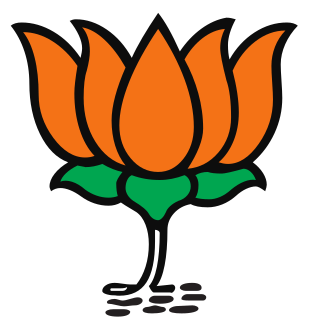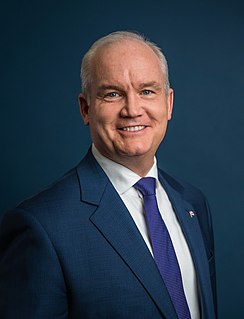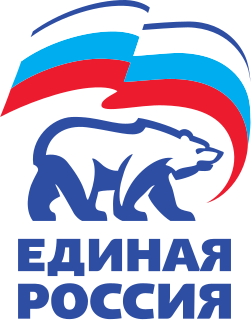The Green Party of the United States (GPUS) is a federation of Green state political parties in the United States. The party promotes green politics, specifically environmentalism; nonviolence; social justice; participatory democracy, grassroots democracy; anti-war; anti-racism and eco-socialism. On the political spectrum, the party is generally seen as left-wing.

The Libertarian Party (LP) is a political party in the United States that promotes civil liberties, non-interventionism, laissez-faire capitalism, and limiting the size and scope of government. The party was conceived in August 1971 at meetings in the home of David F. Nolan in Westminster, Colorado, and was officially formed on December 11, 1971, in Colorado Springs, Colorado. The founding of the party was prompted in part due to concerns about the Nixon administration, the Vietnam War, conscription, and the introduction of fiat money.

The Bharatiya Janata Party is one of two major political parties in India, along with the Indian National Congress. It has been the ruling political party of the Republic of India since 2014. The BJP is a right-wing party, and its policy has historically reflected Hindu nationalist positions. It has close ideological and organisational links to the much older Rashtriya Swayamsevak Sangh (RSS). As of 2020, it is the country's largest political party in terms of representation in the national parliament and state assemblies.

The House of Representatives is the lower house of the bicameral parliament of the Netherlands, the States General, the other one being the Senate. It has 150 seats, which are filled through elections using a party-list proportional representation. Generally, the house is located in the Binnenhof in The Hague, however, it has temporarily moved to the former building of the Ministry of Foreign Affairs at Bezuidenhoutseweg 67 in the Hague while the Binnenhof is being renovated.
Primary elections, often abbreviated to primaries, are a process by which voters can indicate their preference for their party's candidate, or a candidate in general, in an upcoming general election, local election, or by-election. Depending on the country and administrative divisions within the country, voters might consist of the general public in what is called an open primary, or solely the members of a political party in what is called a closed primary. In addition to these, there are other variants on primaries that are used by many countries holding elections throughout the world.
The Workers' Party is a Marxist–Leninist political party active in both the Republic of Ireland and Northern Ireland.

The Ontario New Democratic Party is a social-democratic political party in Ontario, Canada. The Ontario NDP, led by Andrea Horwath since March 2009, currently forms the Official Opposition in Ontario following the 2018 general election. It is a provincial section of the federal New Democratic Party. It was formed in October 1961 from the Co-operative Commonwealth Federation and the Ontario Federation of Labour (OFL).

The leader of the Official Opposition, formally known as the leader of Her Majesty's Loyal Opposition, is the politician who leads the Official Opposition in Canada, typically the leader of the party possessing the most seats in the House of Commons that is not the governing party or part of the governing coalition. The current Opposition leader is Erin O'Toole, who took office following his election as leader of the Conservative Party of Canada on August 24, 2020.

United Russia is a political party in Russia. United Russia is the largest party in Russia, and as of 2021 it holds 326 of the 450 seats in the State Duma, having constituted the majority in the chamber since 2007. The party was formed in December 2001 through a merger of the Unity and Fatherland – All Russia parties.

Samajwadi Party is a political party in India, headquartered in New Delhi. It is mainly based in Uttar Pradesh, with significant presence in other states as well.
Official party status is the Westminster practice officially used in the Parliament of Canada and the provincial legislatures of recognizing political parties in Canada. In official documents, this is sometimes referred to as being a recognized party. The type of recognition and threshold needed to obtain it varies. However, the most coveted privileges are funding for party research offices and the right to ask questions during Question Period.

Elections in the United States are held for government officials at the federal, state, and local levels. At the federal level, the nation's head of state, the president, is elected indirectly by the people of each state, through an Electoral College. Today, these electors almost always vote with the popular vote of their state. All members of the federal legislature, the Congress, are directly elected by the people of each state. There are many elected offices at state level, each state having at least an elective governor and legislature. There are also elected offices at the local level, in counties, cities, towns, townships, boroughs, and villages; as well as for special districts and school districts which may transcend county and municipal boundaries. According to a study by political scientist Jennifer Lawless, there were 519,682 elected officials in the United States as of 2012.

The 1970 United States House of Representatives elections was an election for the United States House of Representatives held on November 3, 1970, in the middle of Richard M. Nixon's first term as president. His party, the Republican Party, lost a net of 12 seats to the Democratic Party, which thereby increased its majority in the House. Many viewed the results of the 1970 election as an indication of public fatigue over the ongoing Vietnam War as well as the fallout from the Kent State Massacre.
Elections in the Philippines are of several types. The president, vice-president, and the senators are elected for a six-year term, while the members of the House of Representatives, governors, vice-governors, members of the Sangguniang Panlalawigan, mayors, vice-mayors, members of the Sangguniang Panlungsod/members of the Sangguniang Bayan, barangay officials, and the members of the Sangguniang Kabataan are elected to serve for a three-year term.

Pakistan Tehreek-e-Insaf is the current ruling political party of Pakistan. It was founded in 1996 by former Pakistani cricketer turned politician Imran Khan. PTI is one of three major political parties of Pakistan along with PML-N and PPP, and the largest party in terms of representation in National Assembly as of the 2018 Pakistani general election. With over 10 million members in Pakistan and abroad, it claims to be Pakistan's largest party by primary membership and one of the largest political parties in world.
An independent or non-partisan politician is a politician not affiliated with any political party. There are numerous reasons why someone may stand for office as an independent.
The New Democratic Party is a social democratic federal political party in Canada. The party was founded in 1961 by the Co-operative Commonwealth Federation (CCF) and the Canadian Labour Congress (CLC). On the political spectrum, the party sits to the left of the Liberal Party.

The 2016 United States presidential election was the 58th quadrennial presidential election, held on Tuesday, November 8, 2016. The Republican ticket of businessman Donald Trump and Indiana governor Mike Pence defeated the Democratic ticket of former secretary of state Hillary Clinton and U.S. senator from Virginia Tim Kaine, in what was considered one of the greatest upsets in American history. Trump took office as the 45th president, and Pence as the 48th vice president, on January 20, 2017. It was the fifth and most recent presidential election in which the winning candidate lost the popular vote.

The United States Senate is the upper chamber of the United States Congress, with the House of Representatives being the lower chamber. Together they compose the national bicameral legislature of the United States.

The Communist Party of the Russian Federation is a communist political party in Russia that adheres to Marxist–Leninist philosophy. It is the second-largest political party in Russia after United Russia. The youth organisation of the party is the Leninist Young Communist League.













